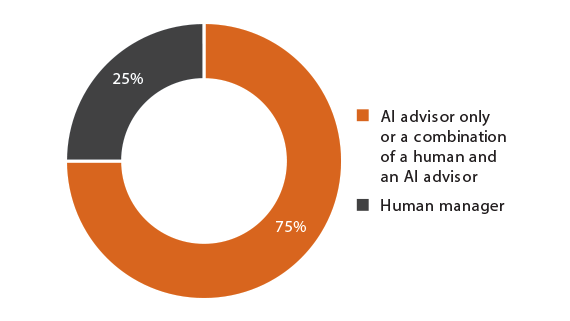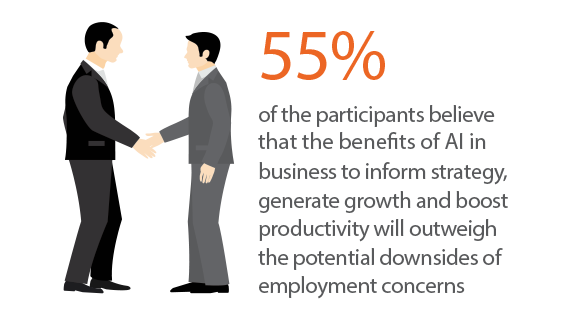AI: Possibilities of transforming the workplace
By: Sudipta Ghosh, India Data & Analytics Leader, PwC India
At the workplace, the advent of Artificial Intelligence (AI) powered solutions (such as digital assistants) are expected to hold the potential for automating a number of timeconsuming, repetitive and less value-added tasks
Overview
As the Artificial Intelligence (AI) market in India matures, firms are looking at unavoidable changes in their workplace. The market is seeing technology leaders and large firms investing in this space. At the same time, a number of AI startups have mushroomed in India in the recent years. To stay competitive and relevant in the market, organisations would do well to rethink existing practices and develop newer business models and offerings. This would involve making use of technologies such as machine learning, deep learning, computer vision and natural language processing among others to power intelligent systems.
A brief overview
As per a recent PwC India Survey, 55% of business decision makers highlighted the benefits of AI for businesses outweighing its potential downside. The benefits include boost in productivity, access to strategic insights for decision making and accelerated growth.
Over 70% of business decision makers indicated that the productivity and efficiency from AI powered solutions such as digital assistants can be brought about by outsourcing repetitive job elements like writing and responding to emails, entering timesheet hours and scheduling and updating calendars, to name a few.
Can AI improve efficiency at the workplace?
At the workplace, the advent of AI-powered solutions (such as digital assistants) are expected to hold the potential for automating a number of time-consuming, repetitive and less value-added tasks. It can be expected that these automations would free up employees’ times to pursue new innovative opportunities. At the same time, AI advisors (machines and systems that gauge employees’ progress and performance and are responsible for their growth and deliverables) at the workplace are expected to help create a more balanced workload and increase working flexibility.
Business decision makers across industries and functions are actively exploring the benefits of humans and machines working together. When asked about which AI-powered solutions they perceived to be of high impact, nearly 51% responded by choosing Machine Learning, while Virtual Private Assistants, Decision Support Systems, and Automated research and information aggregation solutions closely followed as some of the other solutions with high perceived impact (nearly 40% of responses each).
Will businesses be comfortable with an AI powered appraisal system?
An AI advisor assisting in promotions and pay raises was also met with positivity. About 83% of the decision makers showed faith in AI advisors to be either more or at least equally fair in giving promotions and raises compared to their human counterparts. At the same time, 75% of the decision makers trusted either an AI advisor only or a combination of human and AI advisors over a purely human advisor to make the ultimate decision regarding their promotions.
How AI advisors are perceived in terms of fairness in giving promotions and raises

If you were up for a promotion against another employee, who would you want to make the decision?

How can an AI system’s actions be understood?
AI systems entrusted to conduct critical functions, such as performance evaluations, need to be both responsible and explainable. Responsible AI ensures that its workings are aligned to ethical standards and social norms pertinent to the scope of operations. This helps to prevent, or at least minimise, potential biases in outcomes. Explainable AI, on the other hand, ensures that the inner workings of the AI system are transparent and well understood by the system owners and administrators. Thus, its outcomes can be explained beyond reasonable doubt or ambiguity, in the above case, helping build trust among employees.
What are the barriers in utilising AI?
While the above observations underline the favourable impact of AI integration for businesses, potential barriers were also identified. The most common being high costs. Other concerns included skill gap (i.e, the lack of technical abilities among employees), lack of quality data for building effective AI applications, privacy and trust. As AI innovation and the overall technology ecosystem advances, hardware and platforms for storage and data processing are becoming more affordable. Hence, cost as an inhibitory factor may become less relevant over time.

In conclusion
To bridge the skill gap, it is imperative for organisations to invest in the right talent. Skilled employees such as data science professionals, statisticians, robotics engineers and domain experts are among highly sought-after professionals in the field. To tap them might require a combined strategy – hiring specialists in the field, keeping in mind the most impactful use cases for organisations while simultaneously training employees in-house. Tie-ups with academic and professional institutions providing specialised training could also be valuable in this regard.
Finally, AI innovation and implementation for businesses must align with its existing ‘needs’. This could be addressing challenges or making core processes more efficient rather than creating the need to fit AI powered applications. A potential strategy could be identifying pilot projects to make use of readily available data that can help realize quick benefits from AI driven applications. These could then serve as the pathway to early successes thereby facilitating buy in from leaders, investors and other stakeholders for the AI journey.
- Role of individuals
- Role of businesses
- Role of educational institutions
Role of individuals
Considering the pace at which technology is evolving, it may be difficult to predict the skills that will be needed even five years from now. Hence, employees and businesses need to be ready to adapt. Inevitably, most of the responsibility will be borne by the individual, who will be required not only to adopt to organisational change but also acquire new and and upcoming skills and capabilities throughout his/her lifetime. This will help him/her in learning new tasks and even retaining himself/herself at the middle of his career.
Role of businesses
As the use of AI increases within companies, it would help if employees are aware about the complete AI ecosystem, rather than only their function. A unique way for tech companies to increase the number of jobs available to people could be by using technologies such as cognition and natural language processing and generation to break down interconnected systems and tasks and, as a result, sieve out creating innovative tech jobs for humans.
Innovation will play a significant role for businesses in future. Fostering a culture of innovation driven by rewards and recognition has become vital for organisation to identify solutions to their challenges and use technology to address them. Timely skill development of employees through training will ensure smooth transition into new roles within a digitally transformed organisation.
Role of educational institutions
Considering the changes in the technology landscape and in companies, academic institutions need to play a role in skill development by creating an interface for students to connect with industry professionals. Academic institutions can also encourage and inspire students to work in the industry sector on different reallife challenges pertaining to current technologies and practices. These initiatives will help organisations to evaluate their prospective employees and students to get more hand-on industry experience.
Another activity that academic institutions could undertake is upgrading the curriculum, workshops and laboratories with the current industry requirements. Advanced technology infrastructure and equipment have been installed in a few premier institutions . This should be replicated across other institutions as well.
This article was first published in Mint.
Contact us

Contact us














